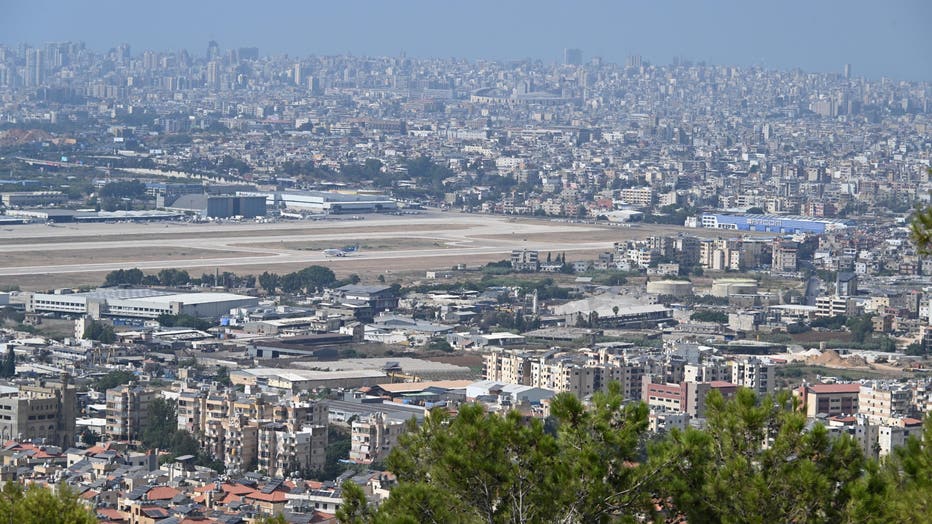Iran, Hezbollah trade attacks: What to know about the latest heavy exchange
War rages on in the Middle-East after overnight strikes
Israel launched a wave of airstrikes across southern Lebanon early Sunday in what it said was a preemptive strike on Hezbollah. The militant group responded that it had launched hundreds of rockets and drones to avenge the killing of one of its top commanders last month. LiveNOW from FOX host Stephanie Coueignoux spoke to Josh Hasten, Middle East correspondent for JNS. Co-host of the JNS podcast "Jerusalem Minute," on the latest.
Israel and Lebanon's Hezbollah on Sunday launched their heaviest exchange of fire after months of strikes and counterstrikes that have raised fears of an all-out war.
The attacks had been anticipated for weeks, after top Hamas and Hezbollah leaders were targeted in a series of strikes last month and Iran’s supreme leader vowed revenge.

A general view of the Beirut Rafic Hariri International Airport after flights were suspended due to the tension between Hezbollah and Israel this morning in Beirut, Lebanon on August 25, 2024. (Photo by Houssam Shbaro/Anadolu via Getty Images)
What happened
Israel launched a wave of airstrikes across southern Lebanon early Sunday in what it called a preemptive strike to avert a large Hezbollah attack.
Hezbollah then said it fired hundreds of rockets and drones in retaliation for Israel's killing of a top commander in Beirut last month.
Both Israel and Hezbollah said they aimed only at military targets.
Here's a look at the ongoing conflict that led to Sunday’s heavy exchange of fire:
Gaza ceasefire talks
Blinken in Egypt for Gaza hostage-truce talks
US Secretary of State Anthony Blinken has arrived in Egypt to push forward talks to end the ten month Gaza war and release the hostages. This comes after Blinken said Monday that Israel has accepted a proposal to bridge the differences holding up a cease-fire and hostage release in Gaza, and he called on Hamas to do the same. "In a very constructive meeting with Prime Minister Netanyahu today, he confirmed to me that Israel supports the bridging proposal," Blinken told reporters. "The next important step is for Hamas to say ‘yes.’"
The attacks came as U.S. and fellow mediators Egypt and Qatar hold talks aimed at a cease-fire in the Israel-Hamas war in Gaza that could ease regional tensions.
Israel and Hamas have been mulling an internationally-backed proposal for more than two months that would wind down the 10-month-long war and free the roughly 110 hostages still held in Gaza.
Meanwhile, Israel and Hezbollah, a regional proxy of Iran bordering Israel in southern Lebanon, have exchanged strikes for the past 10 months during the Gaza war. A series of deadly strikes last month further escalated tensions, with Iran's Revolutionary Guard warning Israel that it is "digging its own grave." Israel's defense minister says the military is ready for a "swift transition to offense."
The U.S. and other mediators see a cease-fire in Gaza as key to averting a wider Mideast war. Hezbollah has said it will halt its strikes on Israel if there is a cease-fire.
RELATED: Parents of Hersh Goldberg-Polin, American held by Hamas, call for hostages' release
Israel Beirut attack
Israel conducts overnight strike on Lebanon
An Israeli strike has killed two people and left three injured in Lebanon Monday, Lebanon’s state-run news agency said. The report came as Israel mulls its response to a rocket attack launched by Lebanon from over the weekend that killed 12 children and teenagers. National Security Expert with the University of New Haven joined LiveNOW from FOX to discuss the latest in the Middle East.
On July 30, 2024, Israeli airstrikes targeted high-ranking Hezbollah figures in Beirut, the capital and largest city of Lebanon. The Beirut strike, which occurred in the city's southern suburbs, resulted in the death of a top Hezbollah commander.
This commander was allegedly responsible for a missile attack on a soccer field in Majdal Shams in the Israeli-annexed Golan Heights, killing 12 children and teenagers. Hezbollah has denied responsibility for the attack.
The strike in Beirut's densely populated area also claimed the lives of five civilians — three women and two children — and injured dozens more.
Hamas leader killed
Less than 12 hours later, the Palestinian militant group Hamas announced that Ismail Haniyeh, the chief of its political bureau, was killed in an airstrike.
Haniyeh was in Tehran attending the inauguration of Iran's new president, Masoud Pezeshkian. Iran and Hamas blame Israel for the shock assassination, though Israel has not officially claimed responsibility for the Tehran strike. The strike presented an immediate crisis for Iran’s new president.
RELATED: Hamas leader Ismail Haniyeh is assassinated in Tehran
Hezbollah and Iran respond
The Associated Press reported that analysts agreed that both Hezbollah and Iran were feeling compelled to retaliate. The Beirut strike targeted a top Hezbollah commander and killed civilians, prompting calls for a response from Hezbollah.
Meanwhile, Iran faced a more complex situation due to the assassination of Haniyeh on its soil during the inauguration of its new president.
RELATED: 'America and Israel must stand together': Netanyahu gives fiery speech to Congress
Potential consequences
Israel's suspected strikes last month were viewed as major security breaches for both Hezbollah and Iran. The attacks increased tensions in a region already close to war, making it crucial for key peace brokers like Egypt and the United States to restore deterrence without causing more conflict.
On Sunday, both Israel and Hezbollah signaled there will be no immediate further escalation, but tensions remain high.
An all-out war between Israel and Hezbollah could spiral into a region-wide conflict that could draw in the United States, which has pledged support for Israel.

